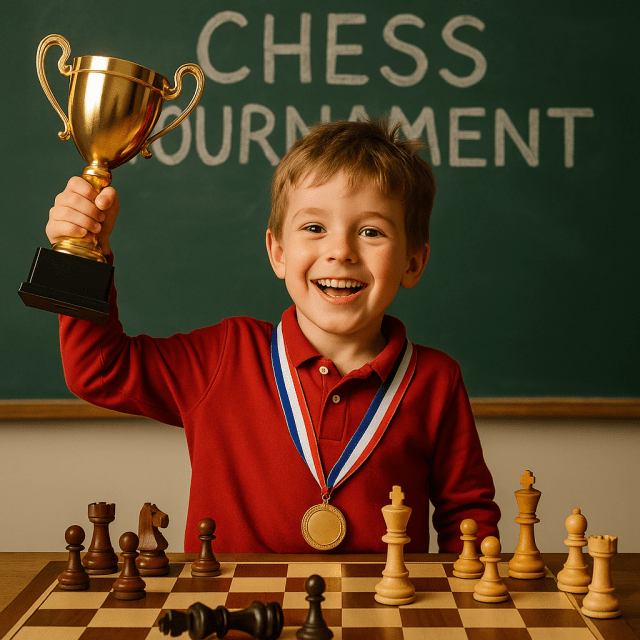
As one of the oldest and most esteemed games in the world, it’s strategy and logic and foresight — plus, not coincidentally, great mental exercise for growing minds. If you’re curious how a child can improve at chess, the answer has a lot less to do with moving pieces around on a board. With the proper guidance and support, any child can hone their skills on the course and start a lifetime of enjoyment of the game.
Here are 9 tested ways to help our children improve at chess, while having fun in the process:
Build Passion Before Pressure
Kids learn best when they are excited about a subject. Instead of legitimizing long bouts of study, first seek to make chess enjoyable and accessible. Let your child play friendly games without the pressure to win or lose. Let them watch animated chess tutorials, make them practice on colorful chessboards and enjoy playing it as story-based games in quest mode that would keep their curiosity alive.
The more a child has FUN when playing, the more natural it will be to them to improve. This deep motivation is the key to longer-term gains.
Lay a Strong Foundation
Mastery starts with the basics. Be sure that your child is comfortable with:
- The movement of each piece
- Check, checkmate and stalemate concepts
- Simple openings such as the Italian Game or Queen’s Gambit
- Importance of king’s safety and domination in the center
These basics learned early on set the stage for learning more complex things. Interactive resources such as ChessKid, Lichess, and Chess.com for Kids can be a fun and effective way to learn.
Playing, Playing, Playing (With a Purpose)
Practice may make perfect — but deliberate practice makes for faster improvement. Casual play is all good when you are just having fun, but there is something to be said about structured play.
Here’s how to balance practice:
- Guide 30–60 minutes of play per day, over 4–5 days.
- Have them practice against various competitors — computers, friends, or online players.
- Do so with a combination of fast games (blitz or rapid) and longer games to practice deeper thinking.
Also, don’t just play — review. Reviewing past games together is also a good way for kids to learn why they won or lost — and how things could have gone better.
Introduce Tactics with Puzzles
Tactics are the sleight-of-hand moves of chess — forks, pins, skewers, discovered attacks, and more. Kids find these flashy tactics fun to learn, as they often result in sudden gains, such as winning a queen or delivering an immediate checkmate.
Use age-appropriate puzzles from:
- ChessKid’s Puzzle Duel
- Lichess Puzzle Streak
- Books like Chess Tactics for Kids by Murray Chandler
“If you solve puzzles every day, your pattern recognition gets better,” Keymer said. “You need that for making good moves fast in actual games.”
Use Videos to Reinforce Learning
Kids don’t all learn the same. For some, listening and watching are preferable to reading. Fortunately, there is a lot of quality chess video content for kids that can be accessed free of charge.
Recommended YouTube channels and series:
- ChessKid.com – safe, fun content for the entire family!
- John Bartholomew’s Chess Fundamentals – straightforward and soothing in his enduring style of teaching
- The Hanging Pawns – easy & fun way of learning useful Opening, Middle Game and Endgame theory
- GothamChess — live commentary full of energy that keeps the children involved
These videos aid in understanding various chess concepts in a visual, interactive way to facilitate hands-on practice.
Incorporate Reading in the Routine
Chess books are one of the most effective ways to upgrade your game. The right book doesn’t just teach concepts — it teaches how to focus, concentrate, comprehend thoughts, and respond with independent thinking.
Recommended books for kids:
- How to Beat Your Dad at Chess by Murray Chandler
- Winning Chess Strategy for Kids by Jeff Coakley
- Bobby Fischer Teaches Chess
Tip: Let your child pick the book. It’s a better way of involving the students in the learning process as it induces interest and a sense of ownership.
Compete (When They’re Ready)
Competitions provide kids with an opportunity to practice their skills in a fun, goal-oriented setting. Local school tournaments, online rapid contests, and chess club encounters may inspire young players to work on their own skills.
Ensure they do the following in their first tournament:
- Understand the clock and touch-move laws
- Have played games with clocks
- Learn sportsmanship (win graciously, lose gracefully)
Tournaments can also provide your child with opportunities to develop confidence, focus, and tenacity — valuable characteristics beyond the chessboard.
Work With a Chess Coach
Once your child is comfortable with the basics and exhibits a deeper level of interest, consider a professionally trained chess instructor to work with your child to their full potential. A good coach:
- Modifies lessons based on your child’s pace and style
- Spots weaknesses early
- Provides structured training programs
- Offers feedback and encouragement
Beginners often make the same mistakes in their first tournaments. A detailed list of the most typical strategies and approaches is available on chess-grandmaster.com
Encourage a Growth Mindset
A child learning to play chess not only learns how it feels to lose, but more importantly realizes it’s all part of the learning process. It may feel disappointing for the child to lose, but with a little attitude shift, they can learn that every time they fail it’s an opportunity.
Encourage your child by:
- Praising effort over results
- Celebrating small improvements
- Debriefing after each game
This attitude is key to them learning more at chess and it will help prepare them for other competitions in sports, academics, etc.
Conclusion: May the Voyage Be Your Destination
If you don’t become a grandmaster at chess, does that mean you never really learned how to play? If you apply the principles we discussed and provide that kind of support, your child will grow up not only to be a better chess player but also to be a more confident, thoughtful person.
The main thing, of course, is that they enjoy the journey. With repetition, experience and perhaps the mentorship of a great coach, they will improve.










